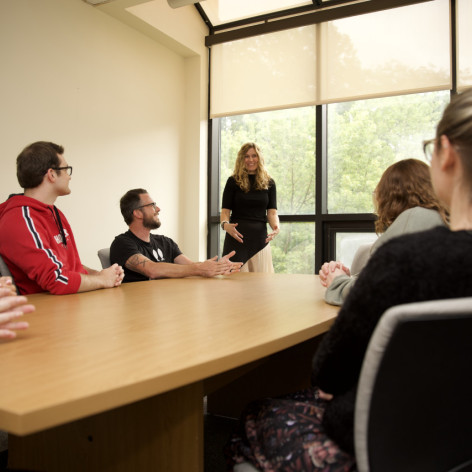Huntington University hosts poverty simulation
FOR RELEASE: Sunday, November 23, 2008
Amie Jaggers, a sophomore social work major from Bryan, Ohio, participates in the Community Action Poverty Simulation. Dennis Brubaker, outgoing 4-H Fair board president for Huntington County, served as a volunteer for the event, staffing one of the tables that represented everything from a bank to a grocery store to a social service agency. Huntington, Ind.-High school and college students recently experienced a Community Action Poverty Simulation presented by the Huntington University Student Activities Board and the Department of Social Work.
On Nov. 12, six high school students and 50 university students participated in the simulation. In addition, 16 community members worked at tables or helped facilitate the event.
Participants were assigned a persona to act out during the simulation - such as an 8-year-old female student or a senior citizen on Social Security - and then went through the steps of daily life for that person. Tables were set up, and students were required to buy groceries, go to the bank and wade through the social services process. "Children" attended schools, and infants-represented by dolls-were carried around by parents.
In May, a Community Action Poverty Simulation was held at Hier's Park in Huntington. The HU simulation was conducted in a similar fashion as the community-wide simulation. The simulation is a tool to help people better understand poverty and sensitize community members and students who work with low-income families regularly.
"The purpose of the simulation was to recreate the daily life of people who live in poverty," said Lissa Shipman, a senior social work major from Parker, Col. "Also, it was to aid in increasing awareness of the many barriers those in poverty face on a day-to-day basis."
The HU simulation ended with a discussion that allowed participants to digest what took place. Participants noted that this experience allowed them to start to understand the feelings of stress, helplessness, frustration and isolation.
"I was able to realize the many advantages I have as a middle class person," said Shipman, "and the validity to the saying 'To whom much is given, much is required' as well as the responsibility we have as Christians to stand along the side the poor and empower them through healthy relationships and knowledge exchange."



